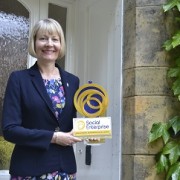Enhancing the contribution HE makes to the economy and society
By Professor Karen Stanton, Vice Chancellor of York St John University
In higher education (HE), we are certainly fond of the old acronym! I’m not sure how many people outside the sector will have heard of the TEF, REF and KEF. These refer to the Teaching Excellence Framework, the Research Excellence Framework and the Knowledge Exchange Framework.
Although, there’s much to be said about both TEF and REF, the focus of this piece is KEF, the newest of the frameworks, which is currently out for consultation until 14th March.
In November 2017, the Government asked the HE regulator of the time, HEFCE, to develop the KEF to support its Industrial Strategy ‘Building a Britain fit for the future’. Now led by Research England, KEF aims to enhance the contribution HE makes to the economy and society. In return, it seeks to bring the inspiration of that wider world back into universities and colleges.
The KEF has 2 main purposes:
- to provide Universities with information on their knowledge exchange activities
- to ‘provide business and other users’ with a ‘source of information, which may increase visibility of potential university partners and their strengths’
Research England is setting out to assess a University’s Knowledge Exchange performance against 7 perspectives:
1) research partnerships;
2) working with businesses;
3) working with the public and third sector;
4) skills, enterprise and entrepreneurship;
5) local growth and regeneration;
6) IP and commercialisation;
7) public and community engagement.
The inclusion of the 7th perspective (public and community engagement) should be applauded, and Research England thanked for its inclusion. But how is it to be measured and presented? It is proposed that a ‘narrative’ will be part of this process.
 It is to be hoped that the Social Enterprise Gold Mark, which York St John University is proud to have achieved, will be recognised as part of the evidence to be used to demonstrate that universities are doing the right thing about knowledge exchange. The Gold Mark recognises business excellence and best practice in governance, business ethics and financial transparency. It is the only quality mark to provide a framework for achieving social enterprise excellence and recognises the important activity that institutions are doing in their local communities.
It is to be hoped that the Social Enterprise Gold Mark, which York St John University is proud to have achieved, will be recognised as part of the evidence to be used to demonstrate that universities are doing the right thing about knowledge exchange. The Gold Mark recognises business excellence and best practice in governance, business ethics and financial transparency. It is the only quality mark to provide a framework for achieving social enterprise excellence and recognises the important activity that institutions are doing in their local communities.
So, what can you do about KEF? If you believe that Universities should have a role in social justice and social enterprise, then you should go online and take part in the KEF consultation exercise – it is open to individuals and organisations.
Perhaps you might what to join me in commenting on the phrase ‘provide business and other users’ with a ‘source of information, which may increase visibility of potential university partners and their strengths’, quoted earlier in this blog. It important that we exchange the knowledge created and kept in universities with the most vulnerable members of our society.
The KEF, and particularly the public and community engagement element, is surely the framework which reflects many university’s values and their commitment to social justice and social enterprise. The Social Enterprise Gold Mark provides a quality standard that could be used to measure how far universities are achieving this.
Professor Karen Stanton is Vice Chancellor of York St John University. York St John changes lives by helping students to develop the confidence, knowledge and adaptability they need for a successful graduate career and fulfilling life.
Karen is also a Trustee of UCAS, Vice Chair of the Cathedrals Group and a member of the GuildHE Executive, as well as a Fellow of the Royal Society of Arts and Chartered Institute of Library and Information Professionals. She is also an Ambassador for the Uprising Charity and Inspiring Digital Enterprise Award.





